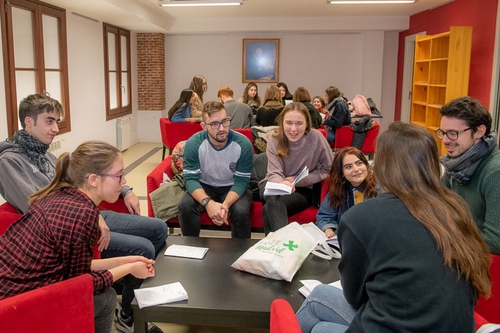Commented Bible Passages
March
I consider that our present sufferings are not worth comparing with the glory that will be revealed in us. The creation waits in eager expectation for the children of God to be revealed. For the creation was subjected to frustration, not by its own choice, but by the will of the one who subjected it, in hope that the creation itself will be liberated from its bondage to decay and brought into the freedom and glory of the children of God. We know that the whole creation has been groaning as in the pains of childbirth right up to the present time. Not only so, but we ourselves, who have the firstfruits of the Spirit, groan inwardly as we wait eagerly for our adoption, the redemption of our bodies. For in this hope we were saved. But hope that is seen is no hope at all. Who hopes for what they already have? But if we hope for what we do not yet have, we wait for it patiently.In the same way, the Spirit helps us in our weakness. We do not know what we ought to pray for, but the Spirit himself intercedes for us through wordless groans. And he who searches our hearts knows the mind of the Spirit, because the Spirit intercedes for God’s people in accordance with the will of God. (Romans 8:18-27NIV)
In this passage, Saint Paul presents an image of creation longing for its liberation: it is “groaning”. This description of a universe that is wounded, inhibited in its proper functioning seems to fit well the reality of the world as we know it—so many unfulfilled desires, wasted resources, wrong roads….
But the apostle’s message goes far beyond simply taking note of an unfortunate situation. It is, in fact, good news, for the yearning of creation is described in terms of the pangs of childbirth. For those who know how to understand God’s language, the groaning is a sign of hope.
Still more important, the text speaks of the place of believers in this context, of those whose life is rooted in the Spirit of God. Far from taking them out of a world marked by imperfection and unrest, the presence in them of the Spirit brings them into a deeper solidarity with the rest of creation. Their sighing, the voice of the Spirit within them, merges with the longing of creation. Still more, these groans are prayer, the expression of a dialogue within God. So why worry that we are unable to pray properly? Through the Son and the Spirit, God has become one with creation to such an extent that the cry of the creature’s wounded heart becomes the driving force of its liberation. Our poor and clumsy words are turned into God’s own language. Our longing for the fullness of life becomes the expression of an authentic hope, one that cannot be disappointed (see Romans 5:5).
![]() Does hope play a role in my life? What things that give me hope do I see around me?
Does hope play a role in my life? What things that give me hope do I see around me?
![]() To what extent does my faith enable me to live in deeper solidarity with the sufferings of the human family, with the “groaning of creation”?
To what extent does my faith enable me to live in deeper solidarity with the sufferings of the human family, with the “groaning of creation”?
![]() How do Saint Paul’s words at the end of this passage help me to understand what Christian prayer is?
How do Saint Paul’s words at the end of this passage help me to understand what Christian prayer is?
 TAIZÉ
TAIZÉ